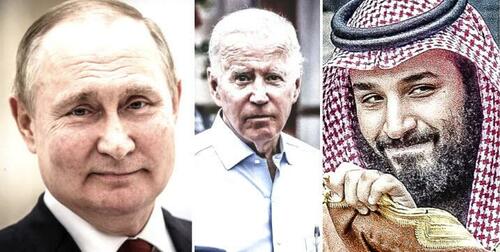Authored by Michael Shellenberger via Substack,
Nobody says he cares more about working people, national security, and the Western alliance than President Joe Biden. Why, then, is he putting them in jeopardy?

On Friday, White House Press Secretary Karine Jean-Pierre defended the Biden Administration’s policy of sending American oil to China and other nations. “When it comes to the oil, it is something that oil companies decide… The Department of Energy can’t dictate what oil companies do with the oil they purchase or where they ship it to sell.”
But the United States Department of Energy (DOE) does decide to whom it will sell oil from the Strategic Petroleum Reserve (SPR). “A total of 16 companies responded to this notice, submitting 126 bids for evaluation,” noted DOE. A dozen won contracts. One was Unipec America, the trading arm of Sinopec, the China Petrochemical Corporation, which is wholly owned by the Chinese government.
There is no evidence that DOE went out of its way to sell American oil to Unipec, and little reason to believe that the U.S. could have refined that oil into gasoline, diesel, and other products had it remained in the U.S. After all, U.S. oil refineries are operating at 94% capacity. The DOE sold the oil to the highest bidders. And it was a coordinated release with international partners, including China, which also released oil from it strategic reserves. Indeed, Bloomberg and others oil market analysts predicted back in November that some U.S. SPR oil would go to China and India.
But the reason our refineries are at maximum capacity is because Biden revoked a permit for a massive refinery expansion in the U.S. Virgin Islands in March and halted its operations entirely in May. And where the U.S. released 50 million barrels of oil in 2021 and 180 million barrels of oil in 2022 so far, China has only released 7.4 million barrels of oil, which is just a half day’s consumption. Is that because China is oil-poor? No. It has equal-sized petroleum reserves to the U.S.
In fact, despite promises in November and again in January to release oil from its reserves, China has instead been increasing its reserves. And there is no evidence that any non-Chinese firms, much less American firms, bought any of its released reserve oil, which undercuts the Biden Administration’s claim that the SPR release was being reciprocated.
But the real drama is about to start. Today, Russia cut off all natural gas flowing through the main pipeline to Europe as part of routine maintenance. Russia is contractually committed to turning the gas back on 10 days later, but many analysts, heads of state, and government officials believe Russian President Vladimir Putin won’t turn the gas back on in 10 days. Why? So he can increase prices, increase Russia’s energy revenues, and pressure Europe to stop supporting Ukraine in its fight against Russia. France’s economy minister yesterday called a complete cut-off “the most likely” scenario.
The consequences of a full Russian gas embargo would be devastating. German industries are already “in danger of permanently collapsing,” warned the head of Germany’s trade unions. Britain has warned that, in order to protect its own citizens, it may cut off natural gas supplies to Europe. If Putin cuts off the gas, Europe would be forced to ration energy, and bail-out both electric utilities and energy-intensive companies.
Higher energy prices are already hurting American firms. Last month, the second-largest aluminum mill in the U.S., which accounts for 20% of the US supply, laid off 600 workers because electricity prices had tripled since the beginning of the year. And in May, midwestern factories owners told federal regulators they were at risk of closing because of “unjust and unreasonable” electricity costs, which are near their highest level ever.
Biden has long been a champion of the American worker and the Western alliance that covers Europe as well as Japan, South Korea, and Australia. Biden last week made a stirring case for manufacturing jobs and labor unions at a rally in Ohio. A few days earlier, after he was asked how long Americans should expect to pay higher gasoline prices, Biden said, “As long as it takes so Russia cannot in fact defeat Ukraine and move beyond Ukraine.”
The obvious thing for Biden to do is massively ramp up oil and gas production in the U.S. both for domestic use and export. It would be a win for American energy firms and workers, as well as for our allies in Europe and Asia. After all, natural gas prices are eight times higher in Europe than the U.S. And yet Biden refuses to do so. Instead he is going to Saudi Arabia to request they pump more oil.
In a Washington Post oped published yesterday, Biden admitted that the Saudis’ “energy resources are vital for mitigating the impact on global supplies of Russia’s war in Ukraine.” But he also claimed, “From the start, my aim was to reorient — but not rupture — relations…”
That’s simply not true. In 2019, at a debate, Biden said he would “make them, in fact, the pariah that they are.” Pariah literally means someone with whom you’ve ruptured relations. As such, Biden’s sending the signal that foreign governments upon whom we depend for energy can kill journalists in our nation’s capital without fearing an interruption of business relations.
Why is that? Why is Biden sacrificing America’s workers, its allies, and its national security rather than simply increase oil, natural gas, and gasoline production? What, exactly, is going on?
Money, Dogma, and Power
Rep. Alexandria Ocasio-Cortez, Treasury Secretary Janet Yellen, and German Chancellor Olaf Scholz
Some have speculated that Biden has repressed domestic oil and gas production, and sold oil to China, to help his son, Hunter, who in 2013 co-founded a private equity firm called BHR Partners that, two years later, bought a $1.7 billion stake in Sinopec Marketing, one of the firms that the U.S. DOE sold SPR oil to recently. Hunter Biden’s lawyer last November claimed that Hunter “no longer holds any interest, directly or indirectly” in BHR. But The Washington Examiner reported in March that business records from China’s National Credit Information Publicity System continue to identify Skaneateles, the entity Hunter Biden owned, as co-owner. And, The Examiner noted, Washington, D.C. business records also listed Hunter Biden as the sole owner of Skaneateles.
Defenders of the president say there is less here than meets the eye.
* * *
Continue Reading: zerohedge.com






Leave a Reply